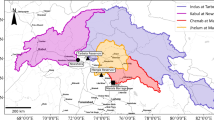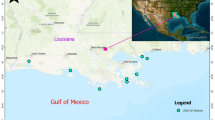Abstract
Highly realistic terrain surfaces are critical to digital terrain analysis and application. In response to limitations of generating high accuracy complex terrain surfaces by conventional methods, a terrain simulation approach based on random forest regression (RFR) is proposed. The objective of this study was to generate terrain surfaces with high precision and high accuracy, by fully realizing the advantages of RFR algorithm for nonlinear fitting. This paper establishes and explains approaches for terrain surface simulation using RFR and an example of this application is provided. In the presented study, the LiDAR point clouds were used as experimental data, and ordinary kriging (OK) and Gaussian geostatistical simulation (GGS) methods were selected as alternative methods. Furthermore, the root mean square error and mean error of the elevation deviation of checkpoints were calculated and the effects of simulated terrain surface were verified for precision and accuracy, using both approaches. Paired t test and Levene tests were performed on the precision and accuracy of the simulated terrain surface, respectively. The experimental results show that the simulated terrain surface based on RFR approach is not only more accurate but also more precise than that derived using the OK and GGS methods.







Similar content being viewed by others
Availability of Data and Materials
The LiDAR point clouds for experiments were downloaded from the website http://opentopo.sdsc.edu/lidar/.
Code Availability
Not applicable.
References
Al-Jarrah, O. Y., Yoo, P. D., Muhaidat, S., Karagiannidis, G. K., & Taha, K. (2015). Efficient machine learning for big data: A review. Big Data Research, 2(3), 87–93. https://doi.org/10.1016/j.bdr.2015.04.001
Alganci, U., Besol, B., & Sertel, E. (2018). Accuracy assessment of different digital surface models. ISPRS International Journal of Geo-Information, 7(3), 114. https://doi.org/10.3390/ijgi7030114
Arun, P. V. (2013). A comparative analysis of different DEM interpolation methods. The Egyptian Journal of Remote Sensing and Space Science, 16(2), 133–139. https://doi.org/10.3846/20296991.2013.859821
Avand, M., Janizadeh, S., Tien Bui, D., Pham, V. H., Ngo, P. T. T., & Nhu, V.-H. (2020). A tree-based intelligence ensemble approach for spatial prediction of potential groundwater. International Journal of Digital Earth. https://doi.org/10.1080/17538947.2020.1718785
Baker, M. R., Palsson, W., Zimmermann, M., & Rooper, C. N. (2019). Model of trawlable area using benthic terrain and oceanographic variables—Informing survey design and habitat maps in the Gulf of Alaska. Fisheries Oceanography, 28, 629–657. https://doi.org/10.1111/fog.12442
Beekhuizen, J., Heuvelink, G. B. M., Biesemans, J., & Reusen, I. (2011). Effect of DEM uncertainty on the positional accuracy of airborne imagery. IEEE Transactions on Geoscience & Remote Sensing, 49(5), 1567–1577. https://doi.org/10.1109/TGRS.2010.2083672
Biau, G. (2012). Analysis of a random forests model. Journal of Machine Learning Research, 13, 1063–1095. https://doi.org/10.5555/2188385.2343682
Bo, L., Libin, S., Huanling, Y., Yan, D., & Yong, L. (2018). Comparison of algorithms for road surface temperature prediction. International Journal of Crowd Science, 2(3), 212–224. https://doi.org/10.1108/IJCS-09-2018-0021
Boikov, A. V., Savelev, R. V., & Payor, V. A. (2018). DEM Calibration Approach: Random Forest. Journal of Physics: Conference Series, 1118, 012009. https://doi.org/10.1088/1742-6596/1118/1/012009
Breiman, L. (2001). Random forests. Machine Learning, 45(1), 5–32. https://doi.org/10.1023/a:1010933404324
Brown, M. B., & Forsythe, A. B. (1974). Robust tests for the equality of variances. Journal of the American Statistical Association, 69(346), 364–367. https://doi.org/10.1080/01621459.1974.10482955
Chen, W., Xie, X., Peng, J., Shahabi, H., Hong, H., Bui, D. T., et al. (2018). GIS-based landslide susceptibility evaluation using a novel hybrid integration approach of bivariate statistical based random forest method. CATENA, 164, 135–149. https://doi.org/10.1016/j.catena.2018.01.012
Derrick, B., Russ, B., Toher, D., & White, P. (2017). Test statistics for the comparison of means for two samples that include both paired and independent observations. Journal of Modern Applied Statistical Methods, 16(1), 137–157. https://doi.org/10.22237/jmasm/1493597280
Du, S., Zhang, F., & Zhang, X. (2015). Semantic classification of urban buildings combining VHR image and GIS data: An improved random forest approach. Isprs Journal of Photogrammetry and Remote Sensing, 105, 107–119. https://doi.org/10.1016/j.isprsjprs.2015.03.011
Fang, K., Wu, X., & Zhu, J. (2011). A review of technologies on random forests. Statistics & Information Forum, 26(3), 32–38. https://doi.org/10.3969/j.issn.1007-3116.2011.03.006
Genuer, R., Poggi, J.-M., & Tuleau-Malot, C. (2010). Variable selection using random forests. Pattern Recognition Letters, 31(14), 2225–2236. https://doi.org/10.1016/j.patrec.2010.03.014
Golkarian, A., Naghibi, S. A., Kalantar, B., & Pradhan, B. (2018). Groundwater potential mapping using C5.0, random forest, and multivariate adaptive regression spline models in GIS. Environmental Monitoring and Assessment. https://doi.org/10.1007/s10661-018-6507-8
Gribov, A., & Krivoruchko, K. (2004). Geostatistical mapping with continuous moving neighborhood. Mathematical Geology, 36(2), 267–281. https://doi.org/10.1023/b:matg.0000020473.63408.17
Hong, F., Tang, J., & Lu, P. (2015). Multichannel DEM reconstruction method based on Markov random fields for bistatic SAR. Science China Information Sciences, 58(6), 1–14. https://doi.org/10.1007/s11432-015-5320-z
Hu, L., Wang, L., & Tao, K. (2012). The analysis and choice of DEM interpolation algorithm based on different landform. Geomatics & Spatial Information Technology, 35(12), 202–206. https://doi.org/10.3969/j.issn.1672-5867.2012.12.074
Jin, L., & Andrew, D. H. (2014). Spatial interpolation methods applied in the environmental sciences: A review. Environmental Modelling & Software, 53, 173–189. https://doi.org/10.1016/j.envsoft.2013.12.008
Journel, A. G., & Ying, Z. (2001). The theoretical links between sequential Gaussian simulation, Gaussian truncated simulation, and probability field simulation. Mathematical Geology, 33(1), 31–40. https://doi.org/10.1023/a:1007558125766
Lakshmi, S., & Yarrakula, K. (2019). Review and critical analysis on digital elevation models. Geofizika, 35(2), 129–157. https://doi.org/10.15233/gfz.2018.35.7
Liang, Y., Bai, M., & Xu, D. (2008). Study on the procedure of stochastic modeling the spatial distribution of micro-topography. Journal of China Institute of Water Resources and Hydropower Research. https://doi.org/10.3969/j.issn.1672-3031.2008.01.001
Ozturk, D., & Kilic, F. (2016). Geostatistical approach for spatial interpolation of meteorological data. Anais Da Academia Brasilra De Ciencias, 88(4), 2121–2136. https://doi.org/10.1590/0001-3765201620150103
Peters, J., De Baets, B., Verhoest, N. E., Samson, R., Degroeve, S., De Becker, P., et al. (2007). Random forests as a tool for ecohydrological distribution modelling. Ecological Modelling, 207(2–4), 304–318. https://doi.org/10.1016/j.ecolmodel.2007.05.011
Prasad, A. M., Iverson, L. R., & Liaw, A. (2006). Newer classification and regression tree techniques: Bagging and random forests for ecological prediction. Ecosystems, 9(2), 181–199. https://doi.org/10.1007/s10021-005-0054-1
Seo, D., Kim, Y., Eo, Y., & Park, W. (2018). Learning-based colorization of grayscale aerial images using random forest regression. Applied Sciences, 8(8), 1269. https://doi.org/10.3390/app8081269
Singh, S., & Gupta, P. (2014). Comparative study ID3, cart and C4.5 decision tree algorithm: A survey. International Journal of Advanced Information Science and Technology (IJAIST), 27(27), 97–103. https://doi.org/10.15693/ijaist/2014.v3i7.47-52
Verikas, A., Gelzinis, A., & Bacauskiene, M. (2011). Mining data with random forests: A survey and results of new tests. Pattern Recognition, 44(2), 330–349. https://doi.org/10.1016/j.patcog.2010.08.011
Wang, Y., Zhu, C., & Shi, W. (2000). Application of B spline and smoothing spline on interpolating the DEM based on rectangular grid. Acta Geodaetica Et Cartographica Sinica, 29(3), 240–244. https://doi.org/10.3321/j.issn:1001-1595.2000.03.010
Wang, Y., Zhu, C., & Wang, Z. (2008). A surface model of grid DEM based on coons surface. Acta Geodaetica Et Cartographica Sinica, 37(2), 217–222. https://doi.org/10.3321/j.issn:1001-1595.2008.02.016
Weinhold, L., Schmid, M., Mitchell, R., Maloney, K. O., Wright, M. N., & Berger, M. (2020). A random forest approach for bounded outcome variables. Journal of Computational and Graphical Statistics. https://doi.org/10.1080/10618600.2019.1705310
Yamamoto, J. K. (2011). On the reduction of the ordinary kriging smoothing effect. Journal of Mining & Environment, 2(2), 25–40. https://doi.org/10.22044/jme.2011.538
Zaria, T., Wilson, J. P., & Myles, C. (2006). A comparison of thiessen polygon, kriging, and spline models of potential UV exposure. American Cartographer, 33(3), 217–231. https://doi.org/10.1559/152304006779077318
Zhou, Q., & Liu, X. (2004). Analysis of errors of derived slope and aspect related to DEM data properties. Computers & Geosciences, 30(4), 369–378. https://doi.org/10.1016/j.cageo.2003.07.005
Acknowledgements
The authors would like to thank the Surveying and Mapping Science and Technology Experimental Centre of Southwest Jiaotong University for providing high-performance computing equipment and network services. The OpenTopography Facility of San Diego Supercomputer Center provide the Lidar point cloud data.
Funding
This research received no external funding.
Author information
Authors and Affiliations
Contributions
ZH: Conceptualization, Methodology, Investigation, Resources, Data curation, Software, Validation, Formal analysis, Visualization, Writing—original draft, Writing—review and editing, Project administration, Supervision, Funding acquisition. ZL: Investigation, Resources, Data curation, Software, Validation, Formal analysis, Visualization, Writing—original draft.
Corresponding author
Ethics declarations
Conflict of interest
The authors declare no conflict of interest.
Additional information
Publisher's Note
Springer Nature remains neutral with regard to jurisdictional claims in published maps and institutional affiliations.
About this article
Cite this article
Huang, Z., Liu, Z. A Complex Terrain Simulation Approach Using Ensemble Learning of Random Forest Regression. J Indian Soc Remote Sens 50, 2011–2023 (2022). https://doi.org/10.1007/s12524-022-01585-w
Received:
Accepted:
Published:
Issue Date:
DOI: https://doi.org/10.1007/s12524-022-01585-w




